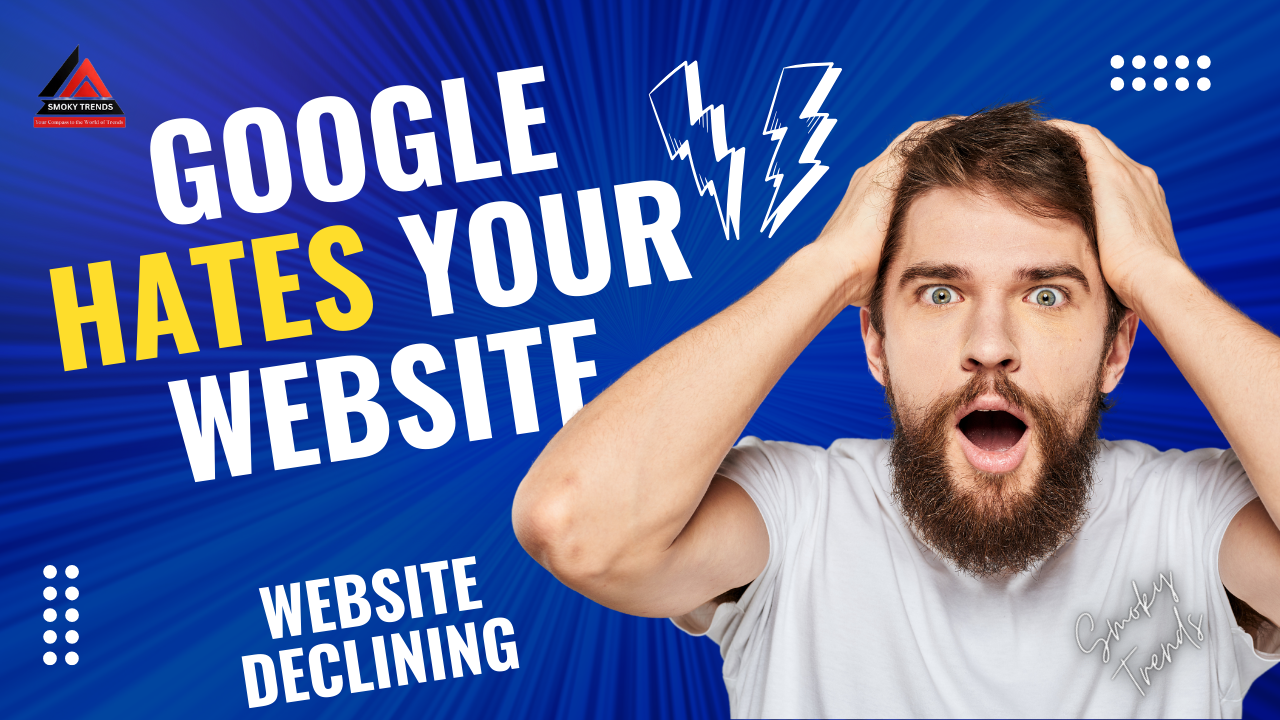How Can You Tell If Google Hates Your Website?
Google’s Role in a website
Google is no doubt the king of search engines, with its algorithms determining the ranking of millions of websites. A website owner recognizes the influence of Google which holds our online success. After all, if Google isn’t a fan of your website, it can spell disaster for your organic traffic and rankings.
The impact of Google’s attitude towards your website
Google’s perception of your website plays a significant role in determining its rankings on search engine result pages (SERPs). Google can decline the ranking of your website and very hard to find visitors if it starts hating a website. This can lead to a major decline in organic traffic and hinder your online visibility.
Importance of identifying if Google dislikes your website
Recognizing whether Google has a negative perception of your website is paramount. Also, it will not only affect your organic traffic but also huge penalties and low ranking in SERP. By actively identifying signs of Google’s disapproval, and improving your website’s standing you must take necessary actions to ensure that your online presence remains strong.
How Can You Tell If Google Hates Your Website?

Declining Organic Rankings
How Can You Tell If Google Hates Your Website?
A sudden drop in organic rankings
A sudden and significant drop in organic rankings is a red flag indicating that Google may not be favoring your website. It’s crucial to track and understand ranking fluctuations using tools like Google Search Console. Keep a close watch on your keyword rankings and identify any sudden drops, as they may signal Google’s dissatisfaction with your site.
Constant decline in organic traffic
A consistent decline in organic traffic over an extended period is another indication that Google may hate your website. Analytics can help you identify long-term patterns and take corrective measures by monitoring and analyzing traffic trends through analytics platforms such as Google.
Lack of visibility on search engine result pages (SERPs)
If your website is nowhere to be found on SERPs or has limited visibility, it could be a sign that Google doesn’t view it favorably. A low click-through rate (CTR) indicates that Google is not displaying your website prominently, which can have a significant impact on your organic traffic. Keep a close sharp watch on your SERP performance and ensure that your website appears in relevant searches.
How Can You Tell If Google Hates Your Website?

Manual Actions and Penalties
Algorithmic penalties vs. manual actions
Google imposes penalties in two ways: Algorithmically or through Manual actions. Algorithmic penalties are automatically applied based on violations of Google’s guidelines, while manual actions are taken by Google employees for severe violations. By understanding the difference is very important as it helps you identify the source of your website’s issues and take necessary actions.
Identifying signs of manual actions
Signs of manual actions include receiving notifications or warnings from Google Search Console, noticing a sudden drop in rankings on specific keywords, or having your website flagged as potentially harmful. Monitoring your Search Console messages and addressing any identified issues promptly can help you recover from manual actions.
Diagnostic tools to identify penalties
A variety of diagnostic tools and resources are available to help you identify if your website has been penalized. Google Search Console’s Manual Actions report is an excellent starting point. Additionally, third-party tools like Moz and SEMrush offer complete insights into your website’s health and potential penalties. Utilize these tools to gather information and evaluate Google’s perception of your website.
How Can You Tell If Google Hates Your Website?
Content and Quality Issues
Poor quality and thin content
Low-quality content, including thin or duplicate content, can significantly impact your website’s rankings and perception by Google. To focus on providing valuable, relevant, and unique content that appeals to your target audience is essential. Invest your time and effort in developing good meaningful articles, blog posts, and guides that offer true value and differentiate you from competitors.
Keyword stuffing and over-optimization
While keyword optimization is essential, overdoing it can harm your website’s standing with Google. Keyword stuffing and excessive optimization practices are viewed negatively. Focus on maintaining a natural keyword density that enhances readability and offers a pleasant user experience. Always focus on creating content that satisfies your audience rather than stuffing keywords.
User experience and engagement metrics
Google places great emphasis on user experience. Factors like high bounce rates, slow page load speeds, and poor mobile optimization can indicate to Google that your website fails to engage visitors effectively. Ensure your website is user-friendly, fast-loading, and mobile-responsive. By giving importance to user experience, you signal to Google that your website deserves favorable rankings.
How Can You Tell If Google Hates Your Website?

Technical and Structural Problems
Crawling and indexing issues
Common crawling and indexing issues hinder Google’s ability to properly analyze and rank your website. Check for XML sitemap issues, confirm that your robots.txt file isn’t blocking essential pages, and address any server or website architecture problems. Ensuring that search engine crawlers can easily access and understand your site is crucial for Google to view it favorably.
Broken links and redirects
Broken links and excessive redirects can harm your website’s perception by search engines, including Google. Conduct regular link audits to identify any broken links or redirects that could be negatively impacting your website. By fixing these issues you ensure a smooth user experience and help Google crawl and rank your website more effectively.
Mobile-friendliness and responsiveness
In today’s mobile-dominated world, a lack of mobile-friendliness and responsiveness can trigger Google’s dissatisfaction. Ensure your website is responsive and provides a continue experience across different devices. Test your website’s mobile-friendliness using tools like Google’s Mobile-Friendly Test and strive for a high mobile performance score.
How Can You Tell If Google Hates Your Website?

Conclusion
In summary, Google’s perception of your website plays a crucial role in its organic rankings and visibility. You must monitor signs such as declining organic rankings, traffic, and lack of visibility on SERPs can help you identify if Google isn’t favoring your website.
By, paying attention to manual actions and penalties, content and quality issues, as well as technical and structural problems can help in improving your website’s ranking and maintaining a healthy relationship with Google. By taking necessary steps to address these issues and improve your website’s ranking, you can ensure a positive relationship with Google and increase your chances of organic success.
Remember, Google’s algorithms are always changing and improving, so it’s essential to stay informed and adapt accordingly to maintain a strong
How Can You Tell If Google Hates Your Website?
How long does it take for a website to recover from a Google penalty?
The duration depends on several factors, including the severity of the penalty and how quickly you can address and rectify the issues
Can I request a reconsideration after receiving a manual action penalty?
Yes, you can submit a reconsideration request through Google Search Console.
Is it possible for Google to penalize a website without any warning or notification?
Google provides warnings or notifications through Google Search Console for manual actions and algorithmic penalties may occur without explicit notifications.
Are there any penalties for using black hat SEO techniques?
Yes, if detected your website may be penalized or even completely removed from search results.
Should I prioritize content quality over keyword optimization?
It’s very important to align your content with relevant keywords for SEO purposes and good content quality is equally important.
How Can You Tell If Google Hates Your Website?
By proactively addressing these issues and improving your website’s standing, you can ensure a positive relationship with Google and increase your chances of organic success. Remember, Google’s algorithms are always evolving, so it’s essential to stay informed and adapt accordingly to maintain a strong online presence.
It’s disheartening to realize Google hates my website. The domain isn’t in the Google index, signaling search invisibility. With no backlinks, content quality issues arise, including thin content and duplicate websites. Spammed domains, over and under optimization, slow-loading pages, and high bounce rates highlight the problem. Manual penalties for black hat practices and bad link neighborhoods compound coding errors and excessive 404’s.
How Can You Tell If Google Hates Your Website? How Can You Tell If Google Hates Your Website?
How Can You Tell If Google Hates Your Website? How Can You Tell If Google Hates Your Website?
How Can You Tell If Google Hates Your Website? How Can You Tell If Google Hates Your Website?

